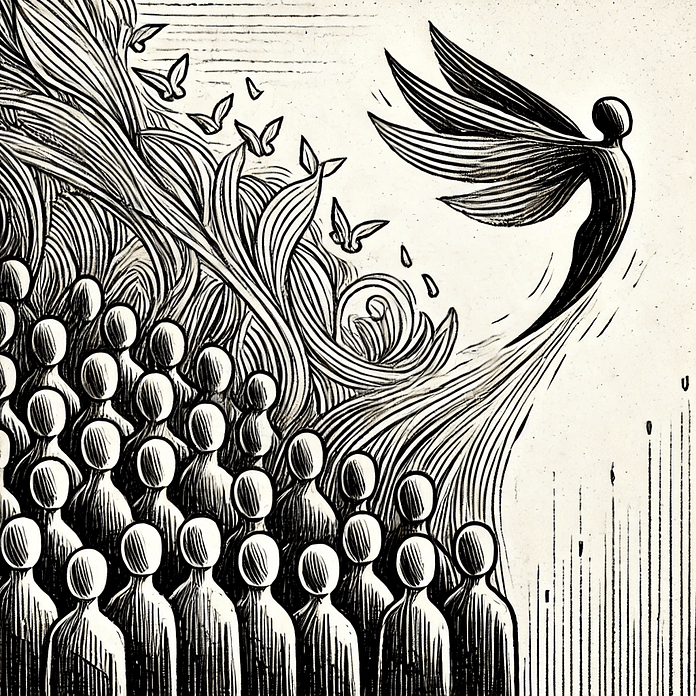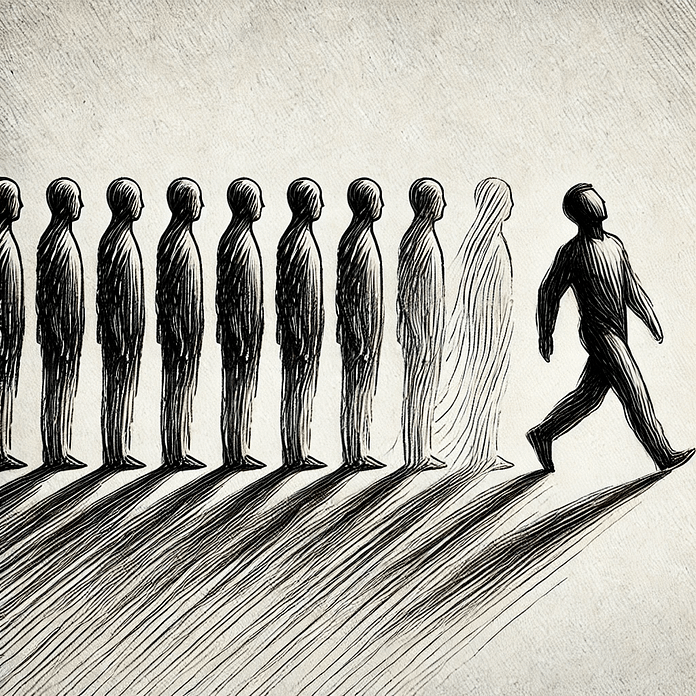To belong is a quiet longing within us, but what does it mean to belong to a society that thrives on flawed foundations? To conform to its norms is to inherit its contradictions. You walk its streets, speak its language, and share its customs, but at what cost to your ethics?
This is the tension between normalcy and moral integrity: the invisible thread pulling you toward acceptance while leaving your values frayed. Conformity is not neutral. It is a choice with consequences. And within this choice lies the cost of complicity.
This article examines the relationship between conformity and complicity, the trade-offs it demands, and the pathways to reclaiming integrity in an imperfect world.
What Is the Relationship Between Conformity and Complicity?
The Quiet Power of Norms
Societal norms exist to create cohesion, but cohesion often comes at the expense of scrutiny. Many norms are built on flawed systems, where power consolidates and injustice festers. To conform is to validate these systems, whether passively or actively.
Take economic inequality. The cultural ideal of success often relies on labor systems that exploit the many for the benefit of the few. By pursuing these ideals without question, we perpetuate the very structures that harm the vulnerable.
When Conformity Becomes Complicity
Complicity begins with silence. It is the choice not to challenge, not to disrupt, not to risk comfort. But silence is not innocence. When you comply with a norm that sustains harm—whether it is systemic racism, environmental degradation, or labor exploitation—you become a thread in the fabric of the problem.
Yet, complicity does not require intent. It only requires inaction. And in this way, conformity sustains the systems it serves.

Why Do We Conform? The Appeal of Belonging
Social Comfort and Security
Conformity offers safety. To align with societal expectations is to avoid conflict, alienation, or economic insecurity. This safety is often subtle, manifesting in workplace hierarchies, cultural rituals, or unspoken codes of conduct.
But comfort is not always innocent. Aligning with norms often means ignoring the injustices they uphold. It means exchanging critical reflection for ease.
Psychological Influences
Studies in psychology, such as Solomon Asch’s experiments, reveal how individuals prioritize group harmony over personal judgment. The pressure to belong distorts moral clarity, replacing ethical principles with collective approval.
Moral Mediocrity in Everyday Life
Conformity fosters a culture of mediocrity, where the pursuit of comfort overshadows the pursuit of justice. When no one questions the system, it thrives unchecked. This is why systemic issues like wage inequality or climate inaction persist—they are easier to accept than to resist.
The Cost of Non-Conformity: Individuality in a Flawed Society
Isolation and Resistance
To resist conformity is to risk rejection. History remembers dissenters like Rosa Parks or Václav Havel for their courage, but in their time, they faced isolation. Resistance to flawed systems often comes at the cost of belonging.
Yet, individuality is not just rebellion. It is the conscious alignment of your actions with your values, even when it disrupts the norms around you.

The Psychological Tension of Conformity
When you value moral integrity but conform to flawed systems, cognitive dissonance takes root. This tension can lead to two outcomes: either you rationalize your complicity, or you choose to confront it.
Reflection begins with a question: Are you living in alignment with your values, or are you prioritizing acceptance over integrity?
How to Resist Complicity and Reclaim Integrity
Resisting complicity in a flawed society is not a simple task. It requires both awareness and action.
1. Cultivate Awareness
Begin by questioning the systems you participate in. How are your daily choices—what you buy, where you work, how you vote—connected to larger systems of harm?
• Example: Research shows that 93% of the world’s largest companies fail to meet basic human rights standards in their supply chains (KnowTheChain, 2023).
2. Develop Moral Courage
Acting against flawed norms often comes with personal risk, but it is necessary. Building courage starts small: speaking out in your workplace, advocating for ethical choices in your community, or standing with marginalized voices.
3. Engage in Collective Action
Individual resistance matters, but collective action amplifies change. Movements like climate advocacy or labor rights campaigns demonstrate how shared effort challenges systemic flaws.
4. Balance Participation With Reform
In some cases, working within flawed systems can drive meaningful change. For example, whistleblowers leverage their positions to expose corruption, transforming systems from the inside out.
Can Conformity and Integrity Coexist?
Not all conformity is ethically compromised. Participating in societal norms like public health initiatives or civic engagement often aligns with moral integrity. The key lies in discernment. Are you conforming to protect the vulnerable or to preserve your own comfort?
Integrity does not demand isolation from society. It demands awareness within it. By aligning your actions with your values, you can belong without losing yourself.
The Path Forward: Your Role in Shaping Norms
You are not powerless. Every action—every question—shapes the systems we live in. When you resist complicity, even in small ways, you disrupt the inertia of conformity.
What systems do you belong to that need questioning? What would change if you aligned your choices with your values today?
Share your thoughts in the comments. Let’s continue this journey together.
Discover more from The Reasoned Journey
Subscribe to get the latest posts sent to your email.


